is "intermediate tarot" just having inside jokes with your cards?
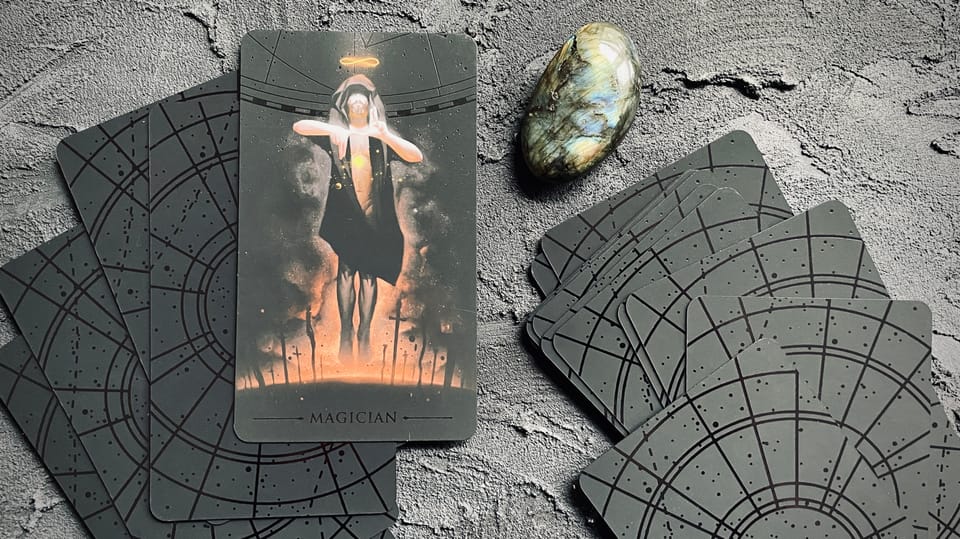
hello, friends. with responses to this year's reader survey rolling in (thank you to everyone who has taken the time to complete this, it's such a help!), i was reminded that it can be hard sometimes to know when you're ready to move into intermediate tarot resources — or to know what intermediate tarot resources even are.
after all, what does it mean to go beyond the basics in tarot? how do you assess when you're more than a beginner? and how do you know when you're prepared to go deeper, to expand your practice, to challenge yourself in a new way?
let's talk about it.
before we get into the intermediate of it all, let me just say that there's absolutely nothing wrong with being a new tarot reader, or being a beginner in general. i absolutely adore working with beginners because they see things through fresh eyes, without all of the trappings and pressure to be some kind of intuitive savant. just like pages, new and early tarot readers see all kinds of meanings and ideas within the cards, and are often less afraid to speak openly about their questions, curiosities, and experiences.
being a beginner is a sacred thing. don't let anyone tell you differently.
and, also — learning tarot can be challenging, especially because for so many of us, we're impatient to get past the beginner phase and into the fluency stage. rather than following that sound, sage advice to slowly work with one card at a time, journaling and studying and carefully considering different meanings, most people dive straight into reading the entire guidebook and trying to learn the simplest, clearest keywords for all 78 cards in the deck. (lest you think i'm some kind of patient evolved creature, don't worry — i absolutely did this too.)
but a focus on memorization over comprehension when learning tarot can lead to challenges down the line — because if you're treating tarot cards like they're flash cards, you're not necessarily building a relationship with them. you might not fully understand where these meanings come from, or recognize what each card might mean for you personally, or even resonate with the keywords you spent all that time memorizing.
this isn't to say that your way of learning tarot is or was wrong, or that your readings are forever fucked because you were excited at the beginning of your practice and jumped headfirst into memorization. but it is to say that if you feel confident that you know meanings for all 78 cards but are finding yourself getting stuck when trying to actually interpret those cards for yourself in response to your questions, you're not alone.
you are probably just ready for some new resources, or a new approach.
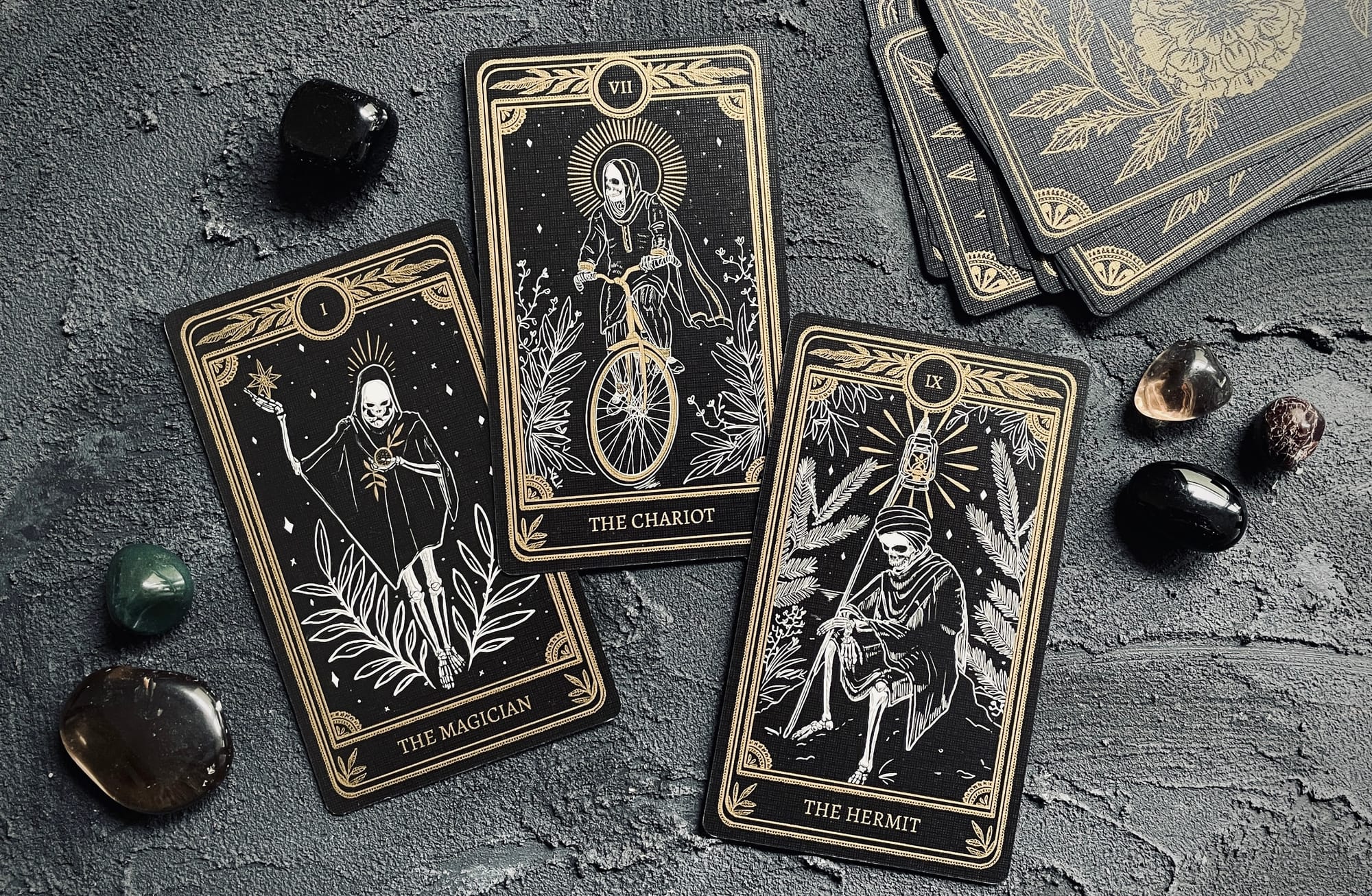
i'll share an exercise you can try right now with your cards in a moment, but first i want to remind you that you are an essential part of the magic in a tarot reading. on their own, tarot cards are a stagnant object: something that you engage with, something that you have to participate with. even if you believe that the cards themselves are ensouled or inherently magical, you still have to contribute to a reading too, bringing your question and your wisdom and your lived experience and your interpretive gifts in order to understand what's going on.
tarot works when you're having a back and forth conversation with your cards — and in order to have a fluent, clear conversation, you need to speak the tarot's language. you can learn that language only by doing readings, but it takes awhile, and can also make the experience more emotionally charged than it necessarily needs to be.
the great thing is that when you learn how to listen to and connect with the cards outside of the context of a reading — when you actually get to know the cards themselves as intersecting correspondences and heartbeats of a story, as moments that connect to experiences you've had in your own life — then you will gain a much deeper and richer perspective on what the cards are actually communicating when you are doing a reading.
you know how you might have a secret language with people that you love or have known for a long time? silly bits and inside jokes and little sounds that let you know exactly what someone is thinking, even if they barely say anything? that's kind of what tarot keywords are, or at least what they're meant to be — a kind of shorthand that you have with these archetypes and figures, these pips and pals. a quick and dirty reminder of something you've been through together, a truth or a discovery or an experience that means something to you personally.
and the more you work with the cards, the more you'll build your own shorthand, and your own language, with your deck.
the keywords that you find in books like mine, in the guidebooks that come with your decks, even the phrases and interpretations standardized and popularized by the rider-waite-smith pack — you can think of those like someone else's shorthand, someone else's relationship with the cards distilled into quick, handy reference points. this doesn't mean that they're wrong, or that you can't use them! but it's not uncommon for tarot readers, especially beginners, to conflate these lists of keywords as the entire meaning of the card, rather than simply serving as an introduction to all that the card can be.
i want you to have inside jokes with your cards. i want you to have silly bits and shorthands and random associations that might not make sense to anyone else but make perfect sense to you. i want you to be able to ask a sharp, incisive question and get a real, profound answer, one that supports and challenges you just the way that you need it to. and i want you to speak the tarot's language fluently, with inflections and accents and slang words and insights that are all yours.
for me, this is what intermediate tarot resources are: classes and lectures and frameworks that empower you to build a relationship with your cards that's your own. not memorizing whatever i tell you or taking my personal meanings as gospel, not feeling beholden to someone else's shorthand or lived experience of the cards. instead, taking the time to build a relationship with your cards that represents you and your beliefs, your desires, your hopes and fears, your experiences and histories, your past and your future.
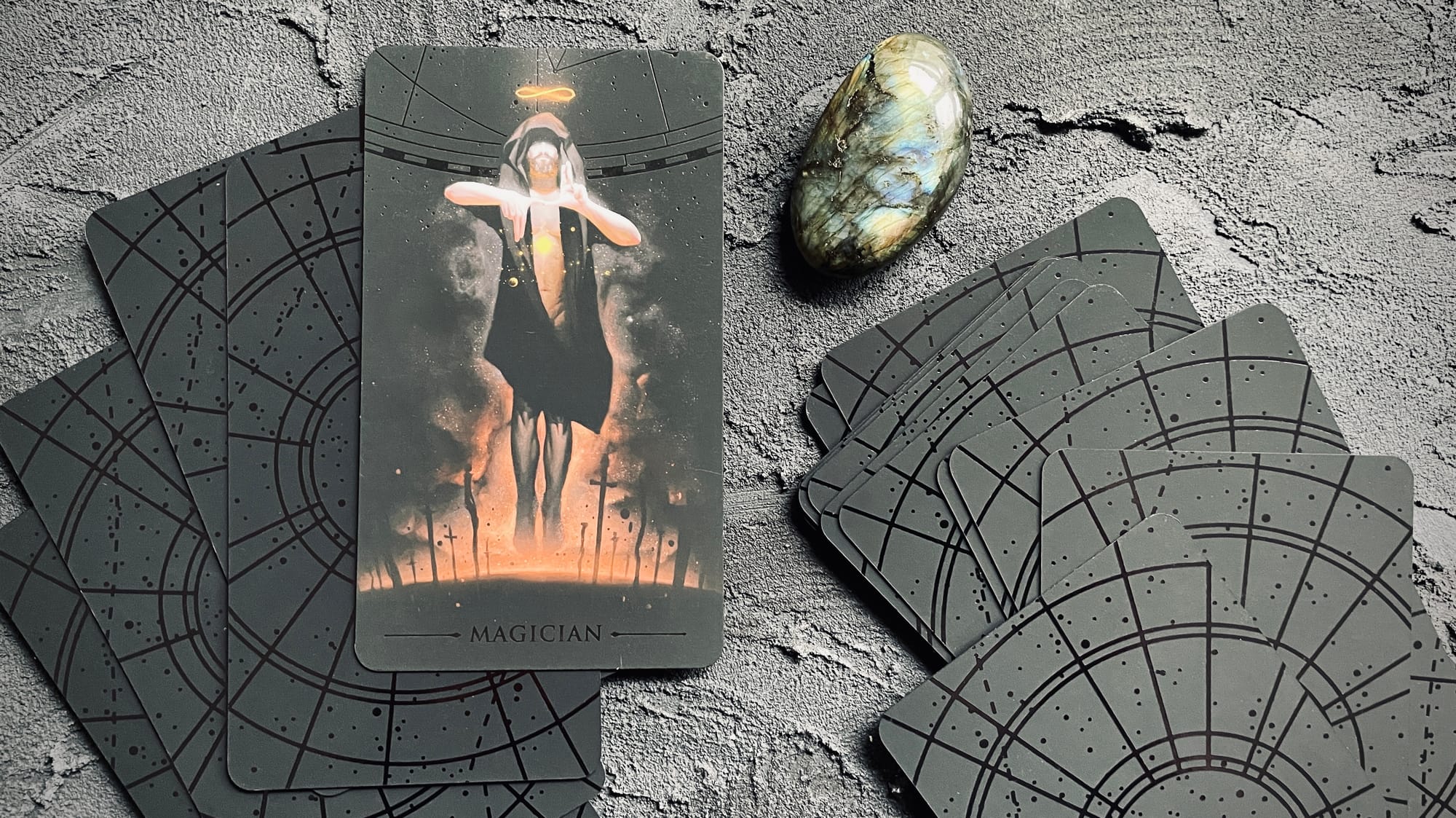
of course, "intermediate tarot" can and does mean something different to everyone. and while my unscientific social media polling pretty universally draws responses that associate memorized card meanings with intermediate reading levels, in truth i think that if you're looking for intermediate tarot resources, your needs will depend on how you learned, where you are in your relationship with the cards, and what your goals are for your tarot practice.
maybe you can do basic readings with a couple of cards at a time, but want to now start using longer tarot spreads or pulling more cards in more complex layouts. maybe you started learning tarot with specific techniques in mind, and now want to play around with some different ones, expanding your personal repertoire. maybe you're ready to bring numerology into your readings, and want to learn more about how the numbers of the tarot contribute to their broader meanings or connected different cards together in groupings. maybe you're great at reading for yourself, but are now wanting to practice reading for other people, either casually or in a professional capacity. maybe you feel good about identifying what individual cards mean in a reading, but want to gain more confidence in weaving those cards together into a story or narrative.
or maybe you're really resonating with what i've been sharing here. maybe you can rattle off memorized definitions and correspondences, but now are ready to start creating your own personal meanings for specific cards, and to more confidently apply those meanings in your readings.
all of these are intermediate tarot practices. and all of them are absolutely possible to learn on your own, with dedicated effort and ongoing intention.
but if you don't want to go it alone — well, that's where i come in. grab your tarot deck, because i've got an exercise for you to try.
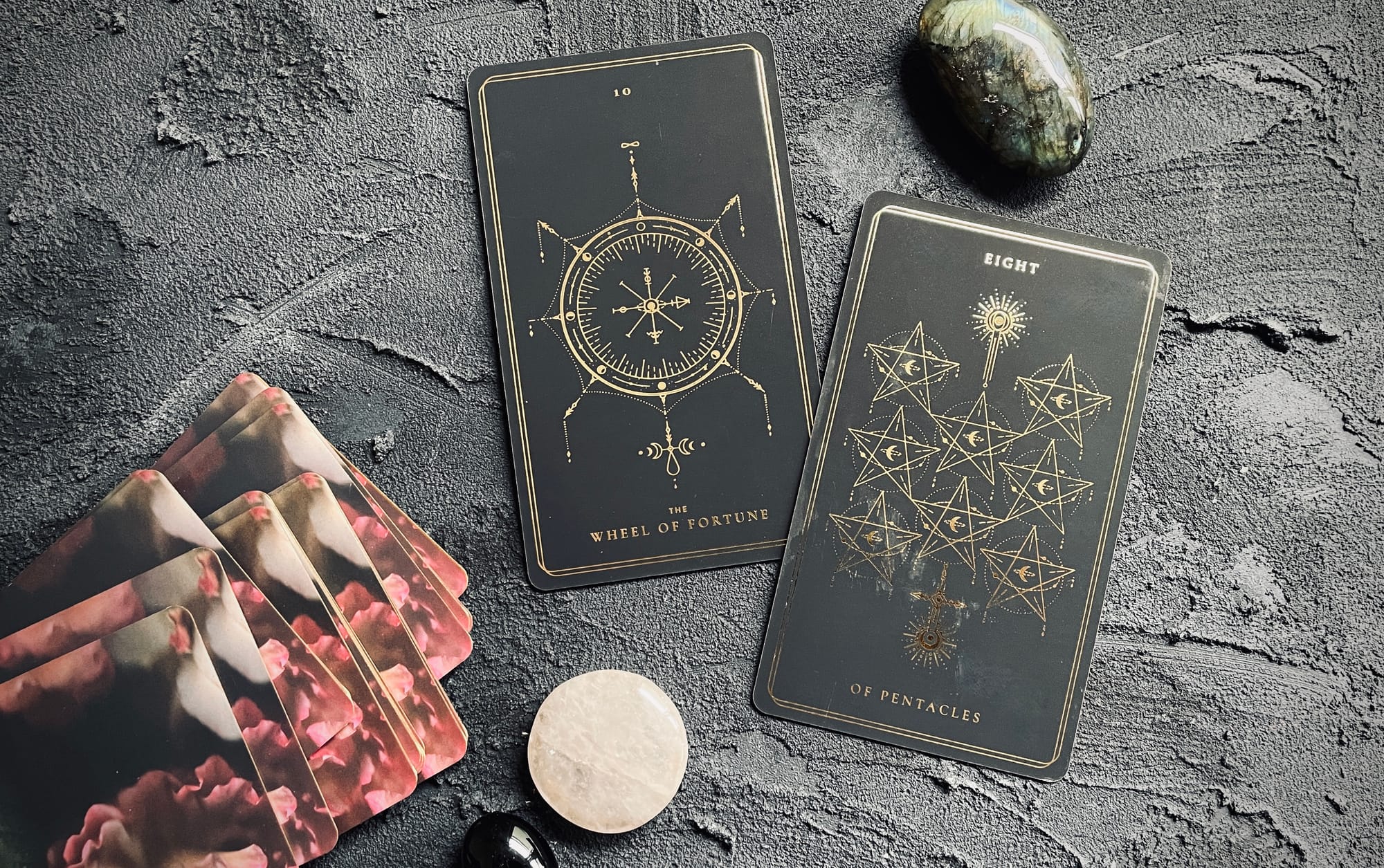
one of my favorite ways to start deepening your connection with the cards is by systematic journaling. note that for this particular exercise and my work in general, "journaling" can mean writing by hand, typing your thoughts into a document or your notes app, making an audio recording or video of yourself talking, or whatever other format works best for you.
look at your tarot cards face up and choose one card that you feel drawn to. this can truly just be on vibes alone, but you can also select a card that answers a particular question, like: which card reflects my current mood? which card feels like an energy i want to embody today? which card represents something i'm dreaming about? which card excites or energizes me? which card makes me feel safe right now? which card acknowledges a fear i'm currently navigating?
it honestly doesn't really matter why you've chosen the card you picked, but if it's supportive for you in this moment to pick a card with intention or to use this exercise to also answer a question for yourself, by all means go for it. it's always lovely to add in some self-care with your tarot work, when you can.
once you have your card selected, take a moment to study it. pay attention to how your body feels, where your mind goes, what your eyes linger on in the image. consider any memories that bubble up, any images that pop into your mind, any songs or scents that come forward.
now, using your preferred journaling method, make a record of anything that occurs to you about this card. take about five minutes to jot down any words, phrases, ideas, questions, memories, impressions, or experiences that feel relevant. if you struggle with this, feel free to start with any keywords or correspondences that you have memorized about this card — but don't limit yourself to those, and challenge yourself to go further. make it personal, even if your notes or ideas feel random.
when the five minutes are up, take a few deep breaths, grab a sip of water, and stretch for a moment before reviewing what you've written down. what came up for you? where did your mind and heart go? what felt familiar, and what surprised you? what did you learn about this card, and what might stay with you in the future?
last thing: pay attention to the words in your notes that feel the most true, the most real, the most connected. circle them, highlight them, or make a list of them. why do these words stand out? how do they compare to the keywords you typically use for this specific card? what would it feel like to add those words to your general interpretations for this card? how do these words or ideas challenge the notions you may have previously had about this card? and what do these associations or meanings reveal about you, and your relationship with this card?
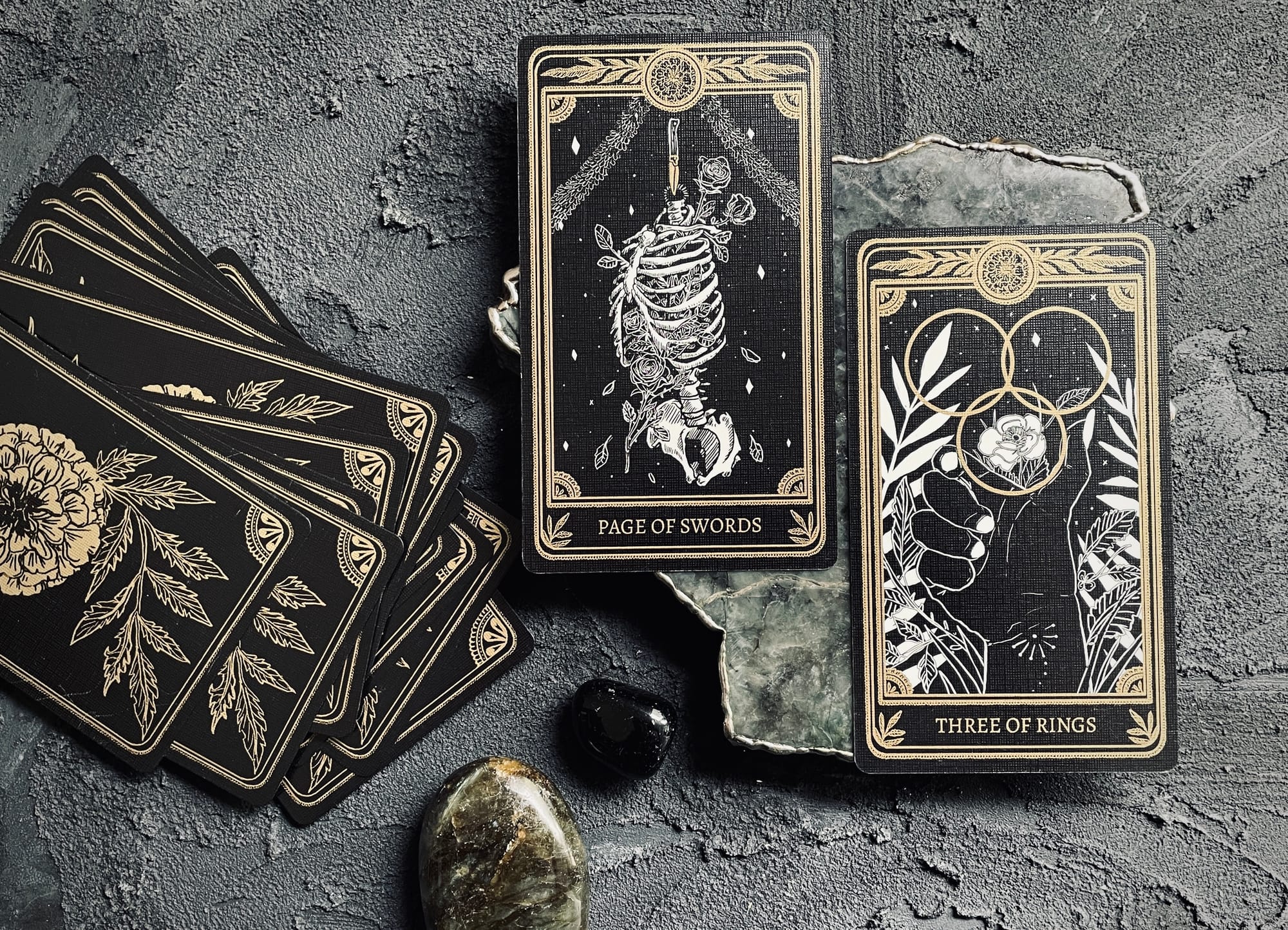
maybe you actually grabbed your tarot deck and did that exercise, or maybe you're saving it for later. or maybe, it felt like way too much effort for a sunday morning, which is also completely legit.
but if you did do this exercise and loved it, if you really vibe with how i'm talking about deepening your tarot practice, if you're craving support and want to build a richer and more personal relationship with your cards, i want to make sure you know that i have a lot of intermediate tarot resources featuring exercises just like this one on my website — most notably my signature membership program, the 3am.tarot conservatory.
the conservatory is a self-paced digital resource library filled with lectures, frameworks, journaling programs, and robust courses designed to help you build out the tarot practice of your dreams, at your own pace and on your own schedule. you can utilize some of my suggested curriculums depending on your goals, or i can work with you to design a personalized plan to get you exactly where you want to go. you'll also get tons of exclusives including discounts on my downloadable products, coaching sessions with me, and specialty resources that you can't find anywhere else.
i created this membership because i wanted people who are ready to go beyond the tarot basics to have the freedom to learn in their own way, and to focus on what they're most interested in. if that's you, then the conservatory might be exactly what you've been looking for.
whether you're ready for the conservatory or not, i hope that this essay and exercise have been supportive for you in considering where you are in your tarot journey, how the cards fit into your life these days, and what you might be ready to dig into next.
remember that if you could use some help finding a resource that meets you where you are, check out my free crossroads quiz, which can help you choose your tarot path and also recommends free and paid resources from my wide catalog of options. and i also offer personalized mentorships, if you're looking to work with me one-on-one to expand your practice or explore a particular topic.
i know that tarot can feel overwhelming, even if you've mastered the basics. but in a world that is also deeply overwhelming, i firmly believe that tarot can help us stay grounded, connected, and inspired. i'd love to help you build a tarot practice that helps you navigate today's challenges and tomorrow's dreams, reading by reading, day by day.
thanks for being here, and i'll be back in your inboxes with more creative journaling prompts soon.
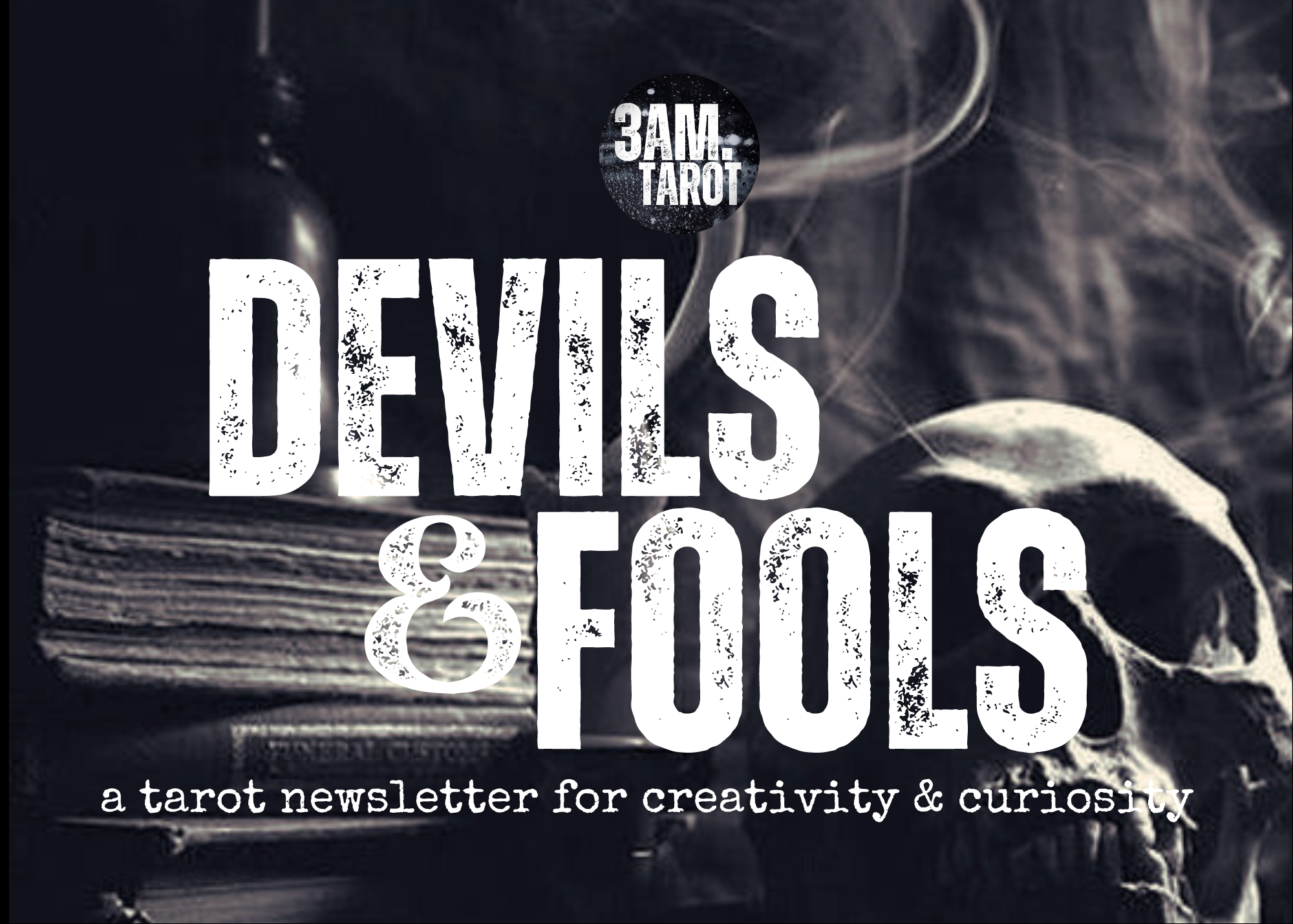


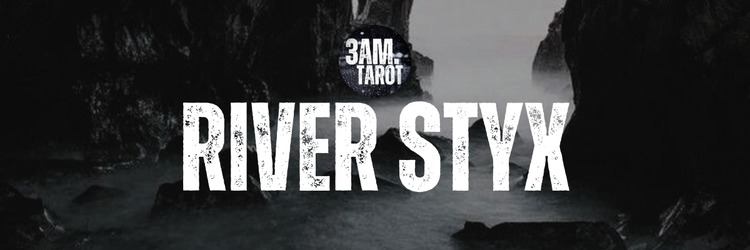


Member discussion